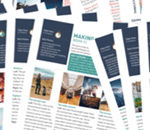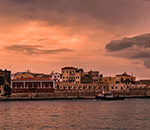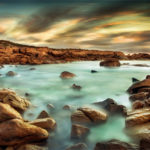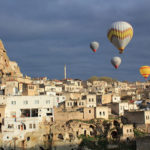When the weather outside isn’t exactly delightful, you can still produce some useful images. With a lightbox, you can use it to work on creating more interesting compositions. The objective is to keep your photographic muscles flexing. Doug McKinlay explains:
Gear for Lightbox Photography
McKinlay uses a 5D Mark III, a 24–70mm lens, and a 100mm macro lens. He recommends a tripod for steady shooting along with a cable-release, just to be extra sure. And, of course, he uses a lightbox (not to be confused with a light tent).
Shooting Height
The lightbox needs to be placed at a comfortable height. This is just for the sake of shooting convenience. McKinlay places the lightbox on two kitchen stools.
Subject
This technique revolves around shooting subjects that are translucent. In other words you want to have a lot of light passing through. McKinlay picks items like cucumbers, kiwi fruits, lemons, and red onions.
Setting Up the Food
You can use any layout as long as it’s presentable. There is no fixed rule here.
Use your imagination and best judgement.
Aperture
McKinlay suggests a starting point of f/8. Ideally, that should give a nice even depth of field.
You can however, change the aperture depending on the food you’re photographing and your lens.
Shutter Speed
Shutter speed will depend on the aperture and whether you are getting a sharp enough shot. With a 24mm lens, for example, you will need at least a shutter speed of 1/25 second to ensure a sharp image.
If your aperture is unable to get you that, then try increasing the ISO number. Careful though. High ISOs increase digital noise.
Exposure
The very bright background in these images, formed by the lightbox, will no doubt fool the meter on your camera to underexpose (in order to make it gray).
To keep the white background from appearing gray, bump up the exposure by one stop or even two.
I hope these tips will open a new avenue for you to explore. Try this creative food photography idea on bad days when you can’t venture outside.
Like This Article?
Don't Miss The Next One!
Join over 100,000 photographers of all experience levels who receive our free photography tips and articles to stay current:










Where did you get your light box?
This is wonderful! I was looking for ideas for using light boxes besides product photography. I wasn’t expecting an actual light box that I use for tracing. Now I know that the other is correctly referred to as light tent. I also love up close and macro photography. This was a lucky find, and I’ve already subscribed,
Good tips, thanks.